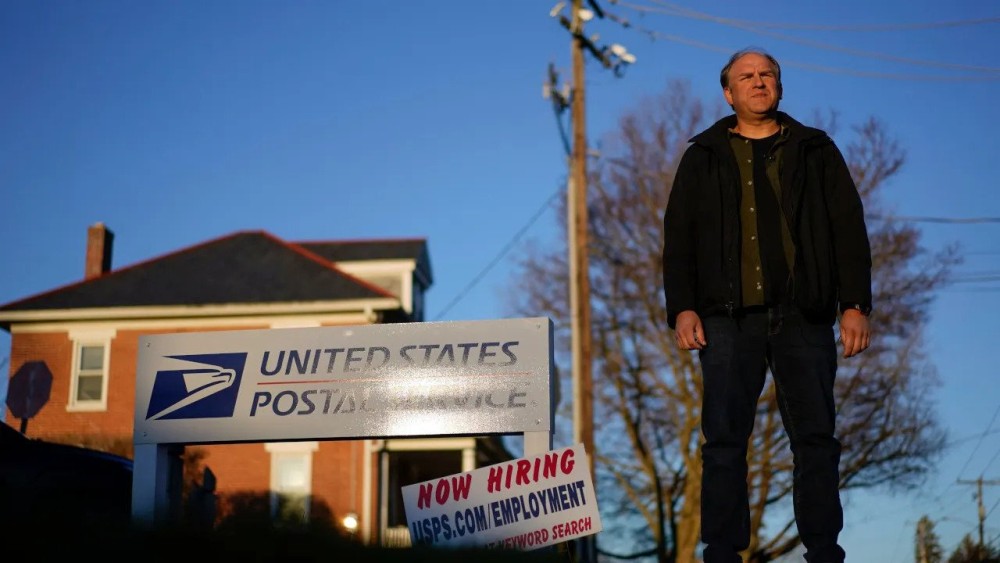Conservative Christians aren't the only ones asking for accommodation in mailman case

Gerald Groff, a former postal worker whose case will be argued before the Supreme Court, stands during a television interview near a "Now Hiring" sign posted at the United States Postal Service on March 8 in Quarryville, Pennsylvania. (AP Photo/Carolyn Kaster)
The Supreme Court justices heard a case on that may sound like another slam-dunk for Christian religious liberty that will bolster its reputation as a friend to the religious right.
In Groff v. DeJoy, a Christian mail carrier, Gerald Groff, said the US Postal Service’s requirement that he work on Sunday violated his deeply held belief that Sunday was his day of rest. (US mail is not usually delivered Sundays, but in 2013, the USPS signed a contract with Amazon to deliver the company’s packages, including on Sundays.)
Over the past decade, the US Supreme Court has sided with a football coach in Washington state who sued after being suspended from his public high school for refusing to stop leading Christian prayers with players on the field after games.
It ruled in favor of two Christian families who challenged a Maine tuition assistance program that excluded private religious schools.
It sided with a Colorado baker who refused to make a wedding cake for a gay couple based on his religious beliefs.
In all these cases, the court favored a Christian individual or organization, either Protestant or Catholic. Groff’s legal team includes First Liberty Institute and the Independence Law Center—groups that have successfully argued religious freedom cases before the court.
But Groff v. DeJoy presents a different case. Organizations representing several religious minorities—Jews, Hindus, Muslims, Sikhs and Seventh-day Adventists—have filed briefs in support of Groff, asking the court to overturn a 50-year-old ruling that gutted a civil rights statute’s protections for religious accommodation. If the court now rules to expand those religious workers’ rights, conservative Christians won’t be the only, or even main, beneficiaries.
At issue is Title VII of the Civil Rights Act, which prohibits religious discrimination in the workplace and requires employers to reasonably accommodate the religious practices of their workers unless doing so would require an undue hardship.
In the 1977 case of Trans World Airlines v. Hardison, the Supreme Court defined that hardship as a minimal burden, using the Latin phrase “de minimis.” That set such a low bar that critics said any employer could deny religious accommodations for the most trivial of reasons.
“The way Title VII is interpreted is incredibly tilted toward employers,” said Harsimran Kaur, senior counsel for the Sikh Coalition, which filed an amicus friend of the court brief asking the court to correct the “undue hardship” standard.
“That standard negatively impacts religious minorities and anyone who has faith practices outside the majority faiths,” Kaur said.
During the COVID-19 pandemic, Kaur said, her office fielded about 30 inquiries from Sikh health care workers who were being told they had to shave their religiously required beards to achieve a good seal for an N-95 mask. The Sikh Coalition argued that employers could purchase alternative respirators for bearded people, but many employers chose not to accommodate those workers.
Sabbath-observant Jews who cannot work on Saturdays have advocated rolling back the Hardison ruling for years. Since 1994, they have championed the Workplace Religious Freedom Act, a bill that would have required employers to make a “bona fide effort” to accommodate workers’ religious practices or observances. The bill, introduced by Democratic US Rep. Jerry Nadler of New York, received wide bipartisan support but never passed.
“This has been a steady and persistent problem,” said Nathan Diament, the Orthodox Union’s executive director for public policy, which represents Orthodox Jews. “Generally employers want to be accommodating. But whether they are or not, it should not depend on the whim of the employer.”
Trade associations, labor unions and the Justice Department, which represents the Postal Service in this case, argue a change in the law might create burdens on other employees, pit workers against management and generally create an undue hardship on the operation of businesses.
Others, such as Americans United for Separation of Church and State, argue a new rule could potentially place too many burdens on nonreligious employees.
“Religious freedom does not mean we can shift the burden of practicing our faith onto other people,” Rachel Laser, president and CEO of Americans United, said in a statement. “Religious freedom has never been a license to harm others, in employment or any other facet of life.”
What would happen if a Christian refused to work with a gay person and demanded an accommodation, or a male Christian nurse refused to work with a female nurse during an overnight shift, citing the Billy Graham rule in which Christian men avoid spending time with women to whom they are not married?
The Roberts Court, however, has been particularly sympathetic to the concerns of religious plaintiffs, ruling in their favor far more frequently than not. Three justices—Clarence Thomas, Samuel Alito, and Neil Gorsuch—have already said they believe the Hardison ruling was wrongly decided.
Many expect a court ruling to favor Groff.
“The main question that some justices will be concerned about is when you impact a third party—how do you guard against helping one person and harming another?” said Diament.
But the outcome of the case, he predicted, is not in question.
“This is not going to be a 5-4 case,” he said. “Either side will be shocked if the court does not rule in favor of Mr. Groff.”
A ruling is expected in June. —Religion News Association





